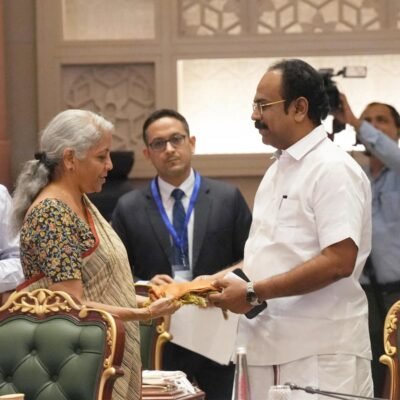THE past decade of Asia’s digital growth was about making transactions instant. The next will be about making them intelligent.
We are entering a new phase of digital finance: one where money can move, think and act with intent. This shift will redefine how value is created, shared and protected across the world’s most dynamic region.
Asia’s new financial architecture
Asia has long been a test bed for digital innovation. In South-east Asia alone, the digital economy is projected to reach US$1 trillion by 2030, with potential to approach US$2 trillion as integration and real-time payment networks deepen, according to HSBC and Google Cloud’s Digital Frontiers 2030 report.
At the centre of this transformation is programmable finance – the idea that payments and assets can carry code and logic. This changes the role of money itself. It means payments that will trigger automatically when conditions are met; loans that adapt to business cashflows; and contracts that settle instantly when verified by data.
Singapore is at the forefront of this evolution. Industrywide projects such as Project Orchid and Project Nexus are pioneering programmable digital money and cross-border payment interlinkages. Together, they are building a foundation for a regional liquidity network, one that allows value to move as seamlessly as information.
For corporates, this programmable financial architecture offers transformative potential. By embedding programmable finance into supply chains, businesses can unlock efficiencies and reduce costs, positioning themselves for growth in an increasingly interconnected economy.
From speed to intelligence
For the past 10 years, speed was the benchmark of digital progress. But our research shows the next decade will be defined by intelligence. This means data-enriched, artificial intelligence (AI)-enabled systems that personalise, predict and self-execute.
“AI-powered financial automation” ranked among the top responses (38 per cent) when consumers were asked what would most improve their digital banking experience. Increasingly, consumers are comfortable allowing AI to make real-time decisions on their behalf. These behaviours are shaping a market where AI agents may soon transact autonomously.
One of the clearest expressions of this shift towards intelligence is hyper-personalisation. As data and AI models mature, financial interactions are becoming contextual and predictive, tailored to each customer’s habits, risk appetite and life stage.
According to Digital Frontiers 2030, 88 per cent of Asean consumers are accustomed to and now expect personalised experiences in their financial apps, and 84 per cent will consider switching to a bank or payment provider that offers more personalised services.
Yet a real significance of personalisation is not convenience; it is adaptability. The same algorithms that refine a customer experience can also make liquidity management or credit underwriting more responsive in real time, turning personalisation into a foundation for intelligent, system-wide finance.
Imagine a world where an AI assistant pays your supplier when a shipment arrives, reallocates idle cash into a yield account, and rebalances your portfolio as market conditions shift – all within a secure, programmable environment. This is not distant speculation; it is already being tested in regulated pilots across the region.
Trust is the new competitive edge
As transactions become faster and more autonomous, trust – not technology – will be the ultimate differentiator.
Businesses are no longer competing solely on products or pricing. They are competing on the credibility of their algorithms, the resilience of their data, the governance behind their digital infrastructure, and how they are thinking about customer needs.
Singapore’s approach to responsible innovation provides a model for the region: policy frameworks that encourage experimentation without compromising stability. It shows that growth and governance can move in parallel and that regulation, when designed with foresight, can be a catalyst rather than a constraint.
At HSBC, we share that belief. Our partnerships with regulators and technology companies, from tokenisation pilots to embedded finance platforms, reflect a commitment to scale digital finance responsibly. The goal is not simply to build faster systems, but smarter and more inclusive ones.
Collaboration to define the next decade
If the 2010s were about connecting consumers to platforms, the 2020s are about connecting ecosystems to one another. Banks, fintechs and cloud providers are now parts of the same value chain, with each contributing expertise to a new digital infrastructure that transcends industries and borders.
This is particularly true in South-east Asia, where 75 million digital entrepreneurs now drive more than half of the region’s online economy. The opportunity lies in helping these businesses grow beyond domestic markets, through open standards, programmable trade finance and interoperable payments that reduce friction and cost.
For businesses, collaboration across ecosystems unlocks new opportunities. Partnerships with fintechs can drive innovation, while open standards and interoperable systems enable seamless cross-border expansion.
The same principles apply to consumers. Embedded finance – from buy now, pay later to digital investment platforms – is giving millions access to services once reserved for the affluent. That is how inclusion scales – not through theory, but through technology that meets people where they are.
The human dimension of intelligent finance
Technology will make transactions faster and systems smarter. But leadership and the human touch will determine whether it makes lives better.
As AI and programmable finance become mainstream, organisations will need to evolve from being adopters of technology to stewards of responsible digital ecosystems. The goal is not only to enable innovation, but also to ensure that progress remains anchored in client centricity, transparency, ethics and human judgment.
Asia has the chance to lead this next chapter of global finance – not by replicating legacy models, but by reimagining how value can move responsibly and intelligently.
The leap from instant to intelligent finance is already under way. The question now is how we design it and who we design it for.
The writer is chief digital officer for Asia (xHK) and MENAT, HSBC
Decoding Asia newsletter: your guide to navigating Asia in a new global order. Delivered to your inbox. Free.




